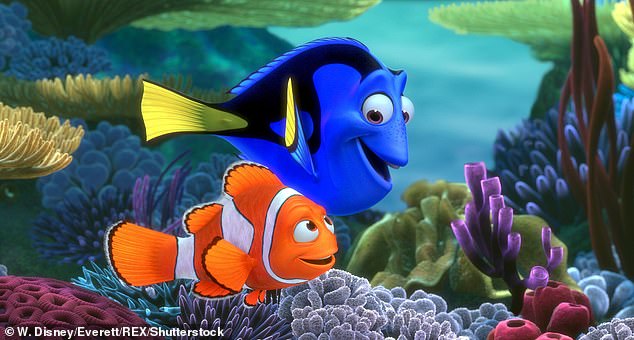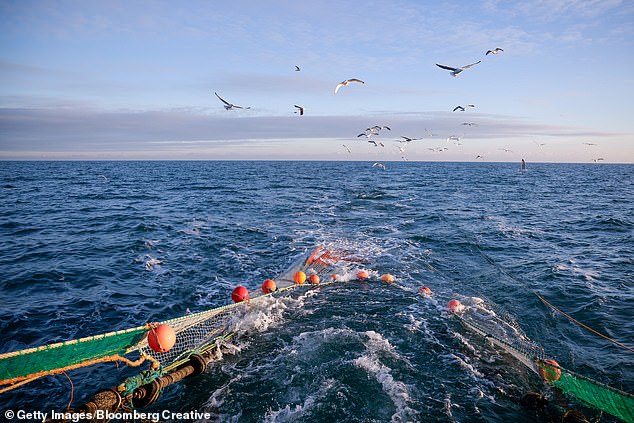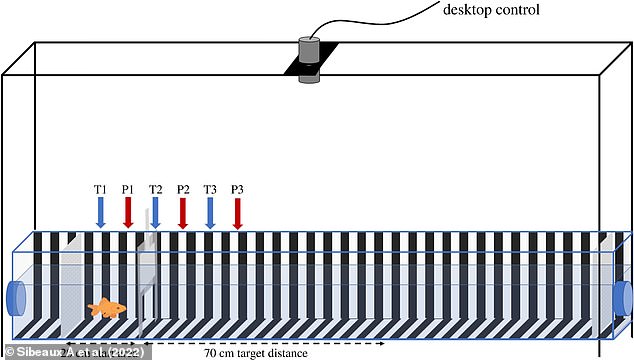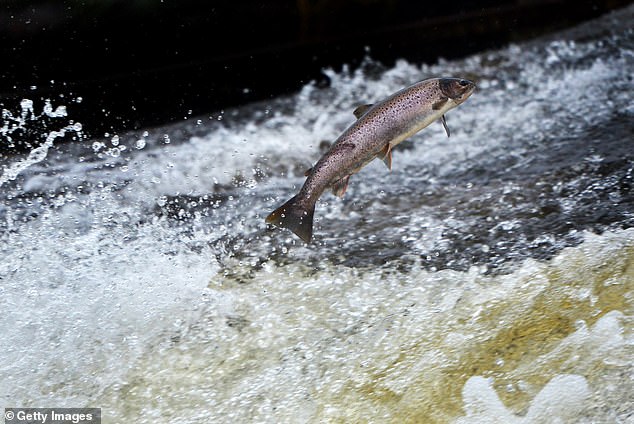Goldfish’s ‘Three Second’ Memory Is a Myth! Pets Can Remember Where They Swam Over a Year Ago, Says Scientist
It is a scientific myth so well known that it has become a common insult.
However, scientists now claim that goldfish’s “three-second” memory is a myth.
Professor Culum Brown, an expert in fish cognition from Macquarie University in Sydney, claims that goldfish, and almost all other fish, have an unerring memory for places and even the identities of their friends.
In a series of experiments, Professor Brown found that rainbowfish could remember a path through a simulated trawl for up to a year.
Professor Brown told BBC Radio 4’s Naturebang: ‘I would argue that any animal that didn’t have that ability, whether it’s a fish or another animal, wouldn’t survive very long in the real world.’
Professor Culum Brown, an expert in fish cognition from Macquarie University in Sydney, says goldfish actually have excellent memories
Goldfish are often criticised for their poor memory and cognitive skills, but according to Professor Brown, the reality is very different.
He says, ‘No matter where you are in the world, people have very, very low expectations of a goldfish’s memory.
“And I don’t think it’s specifically about goldfish – I think goldfish are symbolic of fish in general. There’s a common story that fish have terrible memory.”
Professor Brown points out that if this were true, fish would not be able to learn new behaviours or how to adapt to changes in their environment.
But as widespread as this belief may be, scientists have known for years that fish have impressive learning abilities.
To emphasize this point, Professor Brown designed an experiment to demonstrate how fish learn to escape the clutches of fishing boats.

Unlike Dory in Finding Nemo (pictured), real fish can remember the routes they have taken for up to a year
He placed rainbowfish in an aquarium with a miniature model of a trawl net, into which he had made a hole to serve as an escape route.
As he repeated the experiment over and over again, he noticed that the fish found the escape hole faster and faster.
Professor Brown says: ‘After four or five attempts they are basically swimming calmly towards the net.
“And about halfway through the tank, they literally did a U-turn and swam right through the hole. And I thought, wow, this is incredible.”
The most surprising thing was that when he put the fish back in the device 11 months later, they could still find the hole on their first try.

In an experiment designed to simulate how fish escape from trawl nets, Professor Brown found that fish could remember how to find a single hole in the net up to 11 months after they last saw it
This isn’t the only study showing that fish have much better memories than their reputation suggests.
In 2022, researchers at the University of Oxford trained nine goldfish to swim exactly 70cm across their aquarium before stopping to collect a reward.
The researchers found that the fish could use stripes on the walls of the aquarium to map their environment, much like fish in the wild use rocks and seaweed.
Professor Brown also points out that many fish are able to return to their spawning grounds despite being at sea for years.

In a 2022 study, researchers from the University of Oxford trained goldfish to swim exactly 70 cm in an aquarium, showing that they could remember and map their surroundings
He says: ‘We all know that trout and salmon return to exactly the same place every year to breed. And that is actually quite normal among many territorial fishermen.
‘There is fantastic evidence that fishers’ migration patterns, spawning behaviour and foraging areas are culturally transmitted from individual to individual, through generations.’
For example, the Atlantic salmon lives in the United Kingdom. This fish lays its eggs in the gravel of freshwater streams along the west coast of Scotland.
After hatching, young salmon spend months to years in fresh water before migrating to the sea.

Atlantic salmon like this one in Scotland’s Etterick River can remember their way back to their spawning grounds after spending up to six years at sea
Salmon can remain at sea for up to six years until they reach maturity, after which they swim back upstream in the autumn.
Professor Brown says: ‘If you actually dig into it further, you find that most animal behaviours have been adapted and refined by learning a memory.’
According to Professor Brown, fish even have the ability to recognise each other and prefer to interact with fish they have encountered before.
He adds that, looking back on it now, the idea that a fish has a short memory is “just a crazy idea.”
“It gives us an excuse to mistreat them, because if we have a low opinion of their intelligence then we might be able to mistreat them and get away with it,” Professor Brown concludes.
